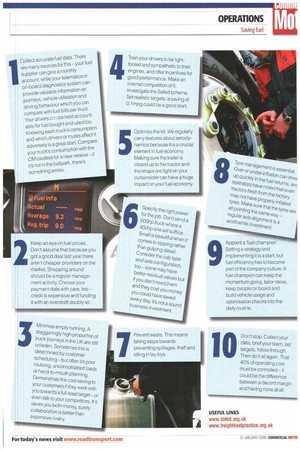' Collect accurate Wel data.There
Page 43

If you've noticed an error in this article please click here to report it so we can fix it.
Iare many sources for this -your fuel supplier can give a monthly account, while your telematies or on-board diagnostics system can provide valuable information on journeys, vehicle utilisation and driving behaviour which you can compare with fuel bills per truck. Your drivers Ca-) be held accountable for fuel bought and used too. Knowing each truck's consumption and which drivers or routes affect it adversely is a great start. Compare your truck's consumption with the CMroadtest tor a near relativeit it's not in the ballpark, there's something amiss.
Keep an eye on fuel prices. Don't assume that because you got a good deal last year there aren't cheaper providers on the market. Shopping around should be a regular management activity. Choose your payment date with care, toocredit is expensive and funding it with an overdraft doubly so.
IMinimise empty running. A staggeringly high proportion of truck journeys in the UK are still unladen. Sometimes this is determined by customer scheduling but often it's poor routeing: unconsolidated loads or hand-to-ni)outh planning. Demonstrate the cost saving to your customers if they work with you towards a full-load target -or even talk to your competitors if it saves you both money, surely collaboration is better than expensive rivalry. 4 Train your drivers to be lightfooted and sympathetic to their engines, and offer incentives for good performance. Make an internal competition of it.
Investigate the Safed scheme. Set realistic targets: a saving of 0.1mpg could be a good start.
5 Optimise the kit. We regularly carry features about aerodynamics because it is a crucial element in fuel economy.
Making sure the trailer is closed up to the tractor and the straps are tight on your curtainsider can have a huge impact on your fuel economy.
Specify the right power for the job. Don't send a 600hp truck where a 400hp one will suffice. Small is beautifu/ when it comes to Spping rather
than gulping diesel. Consider the cab type arid axle configuration, too -some may have better residual values but if you don't need them and they cost
you co you money uld have saved
everyday it's not a sound business investment.
7 Prevent waste. This means taking steps towards preventing spillages, theft and idling in lay-bys. 8 Tyre management is essential. OVer Or under-inflation can show up quickly in the fuel returnsk operators have noted, an that tractors fresh from the even tyres factory may not have properly inflated all pointin res. Make sure that the tyres are
regular g the same way axie
worthalignment is a vvhife investment.
Appoint a 'fuel champion'. Setting a strategy and implementing it is a start, but fuel efficiency has to become part of the company culture. A fuel champion can keep the momentum going, tailor ideas, keep people on board and build vehicle usage and optimisation checks into the daily routine.
Don't stop. Collect your data, brief your team, set targets. follow through. Then do it all again. That 40% of operating cost must be controlledit could be the difference between a decent margin and having none at all.
USEFUL LINKS www.saied.org.uk www.freightbesloractice.org.uk
































































































































































